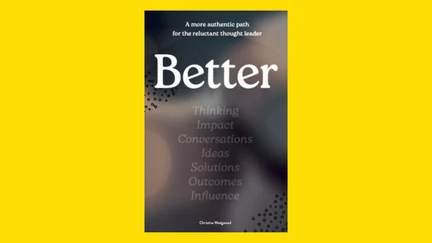Guest post: It’s time for more people to find their voices
How we can all contribute, have an impact and drive positive change.

As the founder and director of Intelligent Ink, Christina Wedgwood has been helping to unlock better thinking, better content, and better impact for her clients since 2011.
Working as writers, coaches and consultants, Christina and her team empower impact-driven experts to improve and evolve their thinking and leverage their ideas to lead us all towards something better.
She recently published Better: A more authentic path for the reluctant thought leader. In today's blog Christina shares a piece with Wellington City Libraries readers.
What would happen if we amplified the ideas of the quiet and considered, the careful questioners and reflective thinkers? What if we unlocked the potential of all who care and want to contribute based on what they know and what they do?
We’ve always assumed that only a confident, eager few have the power to truly influence others towards change. But this simply isn’t true.
Better: a more authentic path for the reluctant thought leader builds on my mission to make sure that everyone who has great ideas or who is doing great work, can have the impact that they want to in the world, because we’ll all be better off with more creative, innovative, inclusive and beneficial ideas out there.

I firmly believe that not only do we need to be able to think well to solve the issues facing us, but we need all those who are doing great thinking and great work to share the valuable, progress-fuelling thoughts that they have.
Thought leadership is an important vehicle for doing this – but most people continue to have a far-too-narrow definition of what thought leadership actually is, and a far-too-small box for who can pursue this path or be influential. This is putting too many people off.
So many people are leading with their thinking and having a positive impact through the work that they do and the value they deliver to clients. They are already, and every day, allowing others to move forward or achieve great outcomes as a result of working with them. Yet, they don’t think of themselves as thought leaders. Instead, they consider that a label that doesn’t belong to them. Thought leadership though, is not a narrow set of specific activities – it’s simply a vehicle to take the impact you’re having beyond the limits of your current capacity to deliver. And it’s a generous way to contribute.
We’re overdue for a broader, better definition of thought leadership – one that celebrates authenticity, welcomes different types of thinking, and allows you to influence without the ick. This is how we will see more great thinking being shared and more varied ways of leading with it being accepted.

A better definition of thought leadership
Thought leadership, at its heart, is what it says on the tin – thought + leadership. It combines the clear conviction that something could be better, with a commitment to working towards making it so, and a genuine and generous desire to help others move towards that version of better for themselves.
Thought leadership requires that we care about something enough to think deeply or broadly about it, and that we work to develop new ideas and insights. The leadership comes when we then use those ideas and that thinking to contribute, to help others.
A better definition for thought leadership captures that special combination of the ability to have ideas and the courage to act on them.
Creating more space for contribution
Widening the possibilities for thought leadership, and welcoming new thinking and thinkers into the space, makes things better for all of us. Diverse groups are better than homogenous groups at finding solutions to specific challenges. When we draw on diversity we don’t only build a more complete picture of an issue, we create a more accurate one. And while we tend to think of diversity along the lines of inbuilt traits like age, gender identity, ethnicity, race, and sexual orientation, there are other differences that are equally important – like diversity in personality, temperament, and thinking/processing styles. As all great leaders know, we’re better off if we bring together people with varied strengths, experiences, industry backgrounds, and areas of study or specialty.
The risk when all the airtime is taken up by those who are used to talking, is that it leaves very little room for others to find their voices. Yet, when all voices contribute, the results are greater innovation and productivity and, for businesses, higher revenue.
Organisations that welcome diverse voices and perspectives are more productive and profitable, have more engaged teams, and are more flexible and resilient.
Businesses are waking up to the fact that they need to make sure all people are heard. From sending questions prior to the meeting to allow for more forethought, to establishing rules that encourage full participation, and facilitating meetings in a way that ensures that everyone can contribute (and that it’s not just the same outgoing people dominating the agenda), there’s much more conscious focus and proactive effort – by good leaders, at least – to ensure inclusion and to gather diverse thoughts.
However, this isn’t only important in the boardroom, it’s important in the world. The quiet ones, too, sometimes hold the answers – so we need all the people with great ideas – and on-their-way-to-great ideas – adding their input. One size very rarely fits all, so it’s time we create space for other types to be effective. There’s not just one way to approach thought leadership, but rather many ways that are not only valid but valuable.
Better is an invitation to anyone who doesn’t feel that they fit the mould. So many of the traits that hold people back from sharing, or reluctant to embark on the journey of building thought leadership, are actually superpowers that we need to see more of if we want great ideas and solutions out there. We’ve all got something to learn from a Better approach.
And only when everyone is given the tools and encouragement they need to share their considered viewpoints, varied perspectives, and rich experiences, can we move forward with the best ideas and solutions.
Enjoyed reading this? There's a copy of Better at WCL:
Better (2024) by Christina Wedgewood